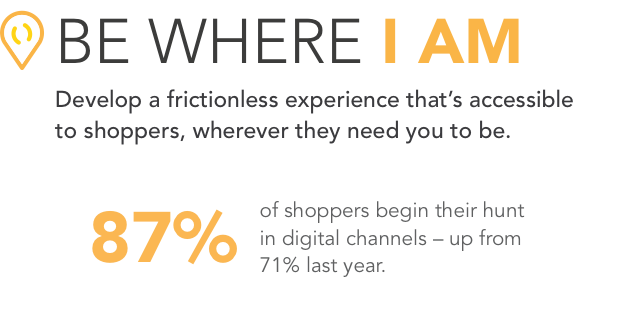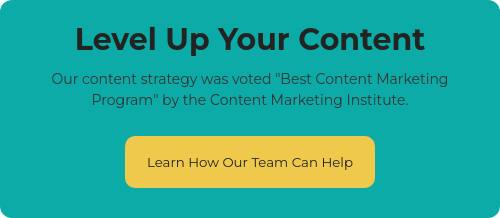Content marketing is a powerful tool for growing any brand. This is particularly true for startups with innovative products in competitive industries.
The truth, as you may have realized by now, is that the old “build it and they will come” approach to marketing doesn’t work anymore. We’re not sure it ever really did.
To stand out, grow your brand, and dominate your market, you’re going to need to gain the awareness of the most profitable segments of the market, interest them in your brand and products, educate them on why they should buy from you, and ultimately ensure that they make a purchase from you, not your competitors.
Advertising can’t help you move your prospects through all four of these phases. While it does have value, advertising tends to work best at creating awareness and keeping your brand top of mind.
But to organically grow your brand and see long-term results, you'll want to develop an effective content marketing strategy.
The modern consumer is more research-oriented than ever. So ask yourself: "Is my brand where they come to find the information they need?"

Looking for the real ROI for your marketing dollars? Be the brand they turn to for the answers to their research.
This is where you turn to content marketing.
Content marketing is not just publishing blog posts, videos, or social media content. It’s hacking the mind of your prospects, understanding their needs and predicting the questions they're going to have, and then leading them to the answers before they even ask those questions.
It’s not magic. It's just good content marketing strategy, and we’ll show you how to make it work.
What Your Content Marketing Plan NEEDS for Success
Content marketing strategy is not a one-size-fits-all formula.
Every brand will have to approach their content strategy cautiously, evaluating what works for them and directing more resources in this direction.
In place of a formulaic approach to content marketing, think of it, instead, as being a philosophy that helps you create the unique formula that works for your business.
Here, we have the eight must-haves to create a killer content marketing strategy.
Detailed Buyer Personas
All marketing begins with knowledge of the audience and their pain points. Your job in building a brand that captures, keeps, and expands its market share will be to truly understand your customer and create content that reflects this understanding.
Lots of tech and SaaS brands dismiss the idea of creating a buyer persona, but we’ve found that you can save endless hours of “brainstorming” simply by creating a well-developed profile of your ideal buyer.
Instead of asking your marketing team what features are most important to your market, ask your buyer persona. Hypothetically, of course. With a strong buyer persona, you'll have key insights into the thought process of your target market. This will give you more advanced hypotheses that will allow for quick and effective marketing testing.
This doesn’t mean that all your content should be created to meet the needs of ready buyers. Remember that while a good portion of your audience will indeed be ready buyers, many of them won’t be.
Instead, the audience for most brands comprises, in addition to ready buyers, people who have an interest in your industry, people who love your brand, and loyal customers who have already purchased in the past. Your content strategy should take all of these groups into account.
Goals and KPIs
Once you have figured out your audience — this is an ongoing process — the next step is to set some goals that will guide the type of content you create.
Goal setting needs to be linked to the overarching business strategy. For example, if you are a new brand that no one knows about, a lot of your initial content should be awareness-driven.
If you’re promoting an innovative product that solves a known problem, your content should be driven to help people understand how it does this. And so on.
Each piece of content you publish will be designed to meet whatever overarching goals you set. And just as with your business-level strategic planning, content strategy goals should be broken down into long-, medium- and short-term goals and objectives.
SEO
Search Engine Optimization (SEO) helps ensure that your content gets out there where relevant people can find it. That is, on the first page of Google results, and ideally, within the first three results.
Searchers rarely go beyond the first page of search results, and 31.7 percent of all traffic goes to the result in the first place.

Good SEO strategy begins with effective keyword research. The best practice is to use a powerful keyword research tool such as Ahrefs or SEMRush, which will show you keyword volumes and keyword difficulties and will suggest some additional keywords to target.
Content Channels
If you have accurately identified your audience and you really understand them, this part will come naturally. Now you know where they hang out online and how they behave there.
For example, while Facebook still has the largest reach of any social network, TikTok is dominant with members of Gen Z.
If you just created the next big thing targeted towards Gen Z, you wouldn’t want to create too much Facebook content. TikTok, YouTube, and Instagram are where the ROI lies for this market segment.
Promotion and Distribution
Again, “build it and they will come” simply doesn't work. Not in content marketing.
No matter how amazing your content is, people need to see it. In an online world that is more competitive than ever, you can’t afford to leave this up to chance. You wouldn't do this to your products, so don’t do it to your content!
Good SEO will help with this, but you also need to promote your content proactively. This will mean having a social media strategy as well as undertaking extensive amounts of networking and reaching out to relevant influencers in your industry.
Competitive Analysis
Even if you’ve just created the best product since sliced bread, you’re still going to have to keep an eye on your competition.
Competitive analysis is particularly useful if your competitors have been in the market a little longer than you have or their content seems to get more engagement than yours.
Again, using modern research tools such as Ahrefs or SEMRush, you can find out what keywords are driving engagement for your competitors and then create better content optimized for the same keywords.
Analytics
Once you have gone through the process of creating an initial round of content, the best practice is to take a step back and evaluate the results.
Sometimes you will have made an assumption or two about your audience that turns about to be incorrect. You may also have overlooked some factor that turns out to be key.
These will become apparent once you are able to develop some understanding of how people have interacted with your content and why.
To do this effectively, here are two critical content metrics to keep an eye on:
- User behavior: What do users do when they click through to your content? How long do they stay, and when they do, do they leave the website entirely or do they navigate to other pages? Which ones?
- User engagement: What do users do with your content other than read it? Is your audience liking, commenting, and sharing your content? If they aren’t doing any of these, you’ll need to go back to the drawing board.
Content Marketing Tools
A Content Management System (CMS) will make the entire process of content marketing much easier. The HubSpot CMS, for example, will help you to plan, produce, publish, and measure the results of your content marketing all within one tool.
HubSpot is one CMS we particularly recommend, and if you would like some help in using it, find out why we're a HubSpot Agency Partner and how we leverage their tools to support your marketing goals.
Get Started with Your Content Strategy
Now that we have shared the building blocks of a great content strategy with you, it's time to get your team together to apply these tips and beat out the competition. Need more help? First Page experts have the experience and insight to help you design a content strategy that grows your brand and brings you long-term, measurable growth.






